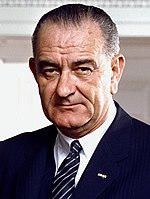United States presidential election in Mississippi, 1964
|
|
|||||||||||||||||||||||
|---|---|---|---|---|---|---|---|---|---|---|---|---|---|---|---|---|---|---|---|---|---|---|---|
|
|||||||||||||||||||||||
|
|||||||||||||||||||||||
The 1964 United States presidential election in Mississippi was held on November 3, 1964 as part of the 1964 United States presidential election, which was held on that day throughout all fifty states and The District of Columbia. Voters chose seven electors, or representatives to the Electoral College, who voted for President and Vice-President.
In a state where fewer than ten percent of blacks were registered voters, and an almost entirely white electorate had lost none of its hostility to civil rights, President Johnson’s policies, not only on Civil Rights but also his “War on Poverty”, were anathema. Governor Paul B. Johnson Jr., though considered relatively liberal for such reforms as repealing statewide Prohibition, told Mississippians not to obey the Civil Rights Act when it became law in the middle of 1964, while it was clear from the time Johnson planned his legislation that Mississippi white Democrats resented Federal intervention with the state’s traditional racial policy.
Neither Governor Johnson nor any other major state or federal politician offered President Johnson any support in his statewide campaign, which was left to the inexperienced Greenville lawyer Douglas Wynn. Although Governor Johnson and four of five Congressmen were silent about supporting Goldwater, John Bell Williams did support the Republican and left President Johnson’s inexperienced and makeshift campaign team with no hope against the state’s electorate’s extreme conservatism. This conservatism was most salient on racial issues, where over ninety percent of Mississippi’s electorate viewed President Johnson as having done a bad job and 96.4 percent opposed the Civil Rights Act vis-à-vis only 54 percent in all antebellum slave states plus Oklahoma. 87 percent of Mississippi voters, vis-à-vis 48 percent in the South as a whole, believed that President Johnson was failing at countering domestic Communism. This concern with domestic Communism reflected the belief, widespread among Mississippi whites for over three decades, that Civil Rights activists were funded by Communist Parties, whether domestic or Soviet.
...
Wikipedia


